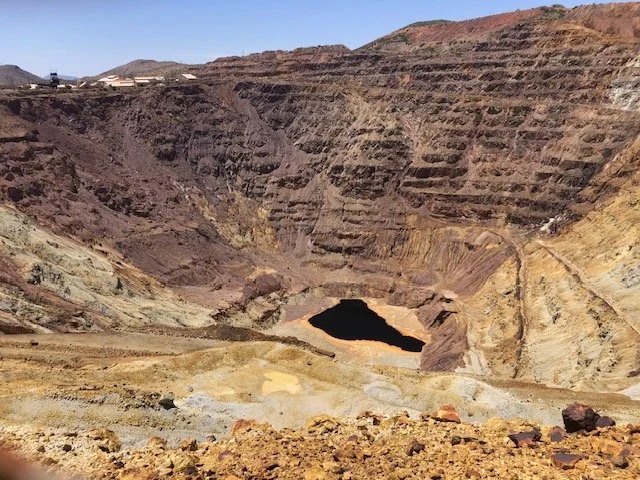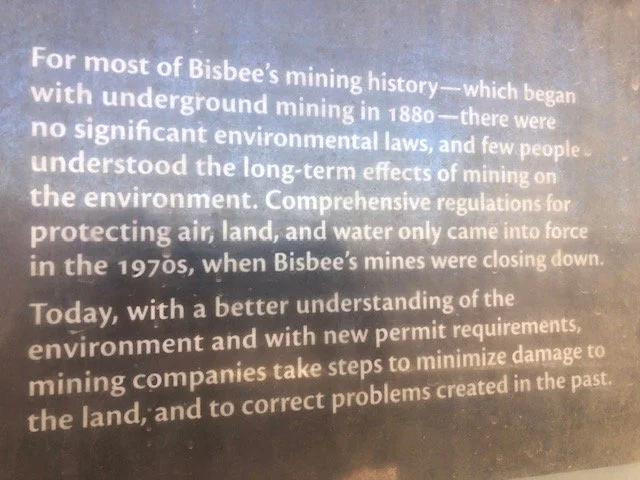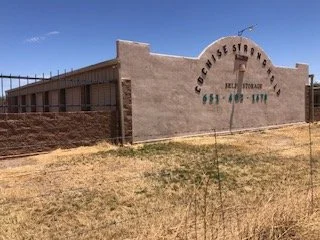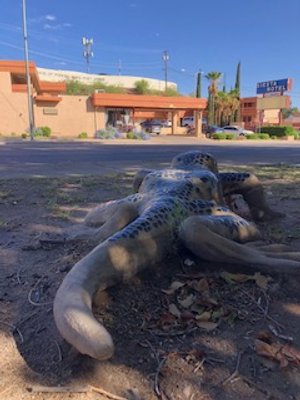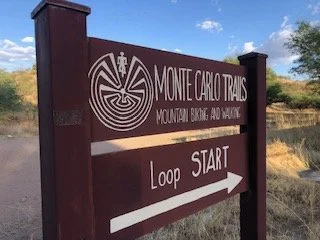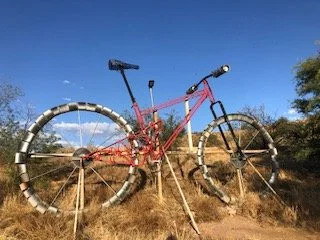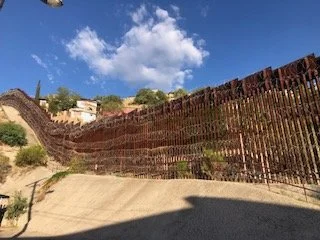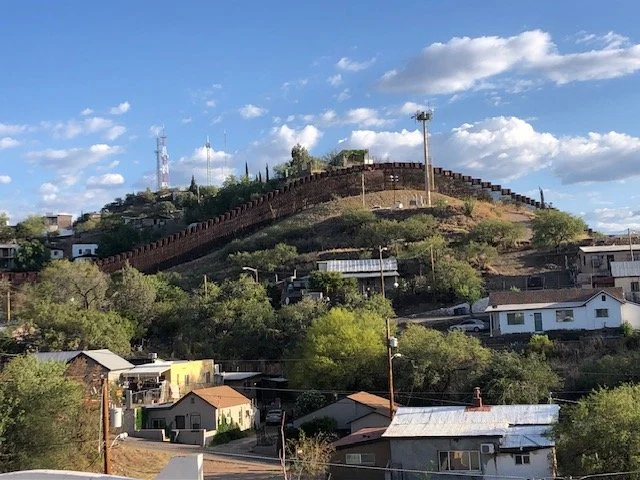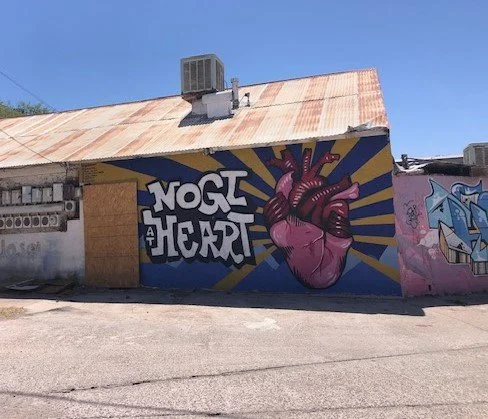Travel Dispatch Four ~~~ A Day in the Life of America
Giving the front entry a go, the glass door opened easy and I strolled over to a place at the counter. One travel day after the next can have you asking, where am I? Certainty was with me in an exacting here and now. Baker’s Dozen Donuts and Coffee in Sierra Vista, Arizona is where I be.
After a brief walk from the motel, what I valued is room to sit before a significant selection of doughnuts, the ones baked new a few hours earlier and I got there at 6 a.m. to make sure. Enough would be available. I ordered half a dozen and one for the tall coffee also sitting at the counter; we three went into morning ease. Coffee, doughnuts and I are a traveling trio that works I had been learning so far on our family excursion.
Doughnuts in volume are just better than skimpy portions. Maple glazed, chocolate raised, pink icing with chocolate sprinkles, and a few plain old fashions—these were a healthy start. Chewing through two was no effort, same with slugging a tall coffee whole milk added, hold the sugar (plenty on doughnuts!). Lazily sitting at the counter, I was gabbing with one of the two bakers.
She appeared Asian, perhaps Vietnamese and she told me she bought the place a few years ago. So far, entrepreneurship was good for her, this one doughnut shop having a few decades prior success. America has these small business fortitudes (every kind imaginable) baked into local culture wherever you travel. Often the glamorous is absent when hustling at a small neighborhood biz and still the focus to go there has colorful courage sprinkles.
This June 28 was a Saturday in 2025 and when this one sorceress-day (what I call spiritual bonanzas) was full-circle done later that evening, I realized the sampling. All wild frontier details I had experienced. A 24-hour panoply of Americana. The place is so damn big, what do the words American culture even mean in regional detail? Strive to discover a few I did during meaningful coincidence, those gold nuggets of travel experience I pick axed during the day, or what we call serendipity American style.
Across the street and behind me on this side of the sidewalk is Fort Huachuca, an active US military-intelligence (oxymoron?) base and a few minutes strolling distance from my doughnut escapade. Upon my gratitude exit from the bakery, I saw in the shiny blue sky high above a crystalline white blimp, a massive floating object. Menacing was its aura on this peaceful Saturday morning and a TARS is just that: Tethered Aerostat Radar System.
A purported purpose is that one “can detect and track suspicious activity from the air with onboard radar and camera systems, offering continuous surveillance along the border.” America has eight TARS. I guess some folks conjure up “suspicious” suspects acting suspiciously wherever suspects might be. I am not one of those folks. Fearsome on a whimsical morning just did not vibe with me so I mixed adrenaline with my caffeine and sugar for accelerating a speedy return walk to the Magnuson Hotel several blocks close.
Resting for a while in the hotel room, the air conditioning was respite from southern Arizona weather crackling a heatwave at 7 a.m. Had I left too hastily from Fort Huachuca just now? The plan had been to visit after reading about a tribute for Buffalo Soldiers, the courageous African American men who fought US racism while fighting in the Civil War, Mexican War, and WWI. But seeing that threatening blimp, I paused and voted for a return visit when politics not so volatile. Guess I’m a blimp wimp because I simply began returning to travel work, the ongoing focus to stay organized.
Placing towels in one organized area signals to the cleaners that I don’t expect anyone to walk around and pick up after me; a simple gesture to acknowledge the hotel cleaner’s work. The writer Barbara Ehrenreich found employment as a hotel cleaner to experience how economic struggle works. Then she wrote Nickled and Dimed: On (Not) Getting By in America. After reading the book, my empathy deepened for any American worker, especially women supporting kids on their own, scrambling from one low paying job to the next. What I shared with teenager Darien is what I write here and so he organized his towels, too. After taking a few minutes to bring light travel bags through the door, here was our housekeeper, pushing her cleaning cart our way. She was Hispanic and in her 50s is my guess. I said thank you.
Grateful for a restful haven at the Magnuson Hotel.
Magnuson Hotel is in a southern Arizona business neighborhood on 43 West Fry Boulevard and like a few other places I stayed had a clean, relaxing environment with basic comfort. These American places I stayed—Bakersfield (CA), Flagstaff (AZ), Mesa Verde (CO), Ruidoso (NM), Gila Bend (AZ)—are not pricey or extravagant. Their purpose is so clear from city to city: functional support for travelers on a brief respite, for construction workers on site nearby, and for those folks who are in between a job, a relationship, an economic mishap, and a strife called life happening. This I saw wherever I went.
The other constant dynamic at each hotel or motel was a family operating the business and every one was from a South Asia country is my guess, perhaps India, Pakistan, or Sri Lanka. At Hotel Magnuson, a woman of color with a pronounced accent was friendly and efficient in her business. In a room adjacent with the door closed I could hear two young children actively playing. The family’s mother had created innovative childcare for free while she worked.
During the afternoon when I had checked in and when departing in the morning, an elderly man late 70s or so sat in a comfortable chair observing customer flow at Hotel Magnuson. When we left, Darien returned the key card to him. A brief smile and quick wave then back to business he sat expressionless again. In America, families often run teamwork to keep a hotel or motel in business, another small biz model without fanfare but vital for many lives, the families who make the space possible and the people who vulnerably need a place to rest.
Driving the Nissan Versa from the parking lot onto the main road I made a swift left turn within seconds. Right next door is Family Dollar store. These stores are prolific and guesstimate is that I had seen 30 or more of them across the southwest. Usually, I store various camping foods in a bin, plenty to last for a while so shopping in a Family Dollar was still a new consumerism on the road trip this far.
At 9 a.m. I was the first customer. Inside were bargains, bargains, and when you turned an aisle corner, more bargains stocked in tidy rows on shelves everywhere. This place is inexpensive but not cheap as in low-quality. The selections here were otherwise. Quality food items at low cost then. That Family Dollar feeds any family in need, instantly, on resourceful funds is heartening.
The Family Dollar in Sierra Vista, Arizona is fantastic.
The camping food bin was full and I left the store after a friendly conversation with the store manager. Pride in keeping the store immaculate and well-stocked was obvious. I thanked him and as Sierra Vista appeared in my rearview mirror, I laughed to myself recalling three unlikely corners on a triangle of American culture. Family Dollar Store on one.
And a few streets away was the Sierra Vista Food Co-op where I purchased cantaloupe greens that were expensive. But the unlikely is that a co-op means to join at a $200 annual cost creating a healthy food community consciously defining what one is. And this nutrition contrast is wholly a microcosm of America.
I paid $5 at the Sierra Vista Food Co-op for a handful of sprouts. At Family Dollar being clever that price might purchase two meals for myself and the teenager in the family. Truly I cannot judge which is “better” given diverse life expediency. We do what we need to do for any meal on any given day.
And a third corner on this paradoxical triangle was that in Arizona gun stores are as prolific as food options. One major store was right next door to the hotel. Has been a long while since purchasing a gun appeared as common as going into a doughnut bakery. The United States is a country of stunning disparate continuums of food, economics, ethnicity, and thus one powerful flow which is access to a livable, healthy life.
Now we really had left Sierra Vista in the rear view mirror a longways behind. Out in these yonders the family go-cart car was crawling along on 90 south first, then 80 east for a brisk half hour. We had backroads America, plenty of that vast rural the country be known for. Low beige plains of sand and desert shrub until elevation began to go into mountain terrain and, in this case, the Queen Mine.
Bisbee copper mine or what remains since closure and is on display when arriving to Bisbee.
A sign to explain why the mining for profit companies did not realize the environment might be impacted.
If you take an intensive copper mining history, add environmental awareness that mined lands had been stripped as far as earthly possible, then decades later work from a painter’s palette to apply bright murals on steep walls and a right is reserved for you to call the town Bisbee. Plenty art designs painted on walls that are often vertical since the town is embedded in the side of a steep mountain and immersed in an artsy vibe throughout. Kudos to the citizens’ pride and power to exist here, too. Would my serendipity pick axe be useful here to source bargains and sales and frugals? This town kept my skills lively adept.
My travel chuckle was heard in the car while driving around a narrow corner on a Bisbee residential street. Before me was a routine convenience store at a Circle K gas station, a stark contrast to the artsy town design seen everywhere so far. After purchasing $20 of gas and two slices of pizza plus a large fountain Pepsi for $5, this road trip 24-hour endeavor was on a day in America sampling, for sure: morning doughnuts, budget hotel, military-intelligence blimps, guns galore, frugal food, expensive food, backroads across vast terrains, and a gas station that I could discover alike in downtown Los Angeles or in a historical mining town in rural south eastern Arizona. The time on this Saturday morning was now 11 a.m.
Sierra Vista to Bisbee and eventually arriving to Nogales was our one touristy day.
At Bisbee Junction what I did was steer the car onto 92 West. Already on backroad stretches of active wildlife ecosystems, and barren of human existence for miles across the horizon, an even further back road was an option so there I went. Near an outpost called Hereford, Arizona I flipped my view along the road side and qualified this excursion to seeing what America’s further posts actually kept posted and saw this.
On the right side of the road, we had what I had seen in hundreds of locations across America’s mighty nation and that is the ubiquitous storage unit. Tall, wide, narrow, robust, adobe tiled, corporate cemented, hippie art plastered, and infinite more designs are where those living in the states keep united through storage. What is in these boxes I simply do not wish to know. Too many. Too resplendent. Too strange. When will the indefinitely stored items be actually used in this lifetime is what I wonder.
This storage unit was called Cochise Stronghold, which gave me a heartfelt chuckle since Cochise was a brilliant Apache warrior strategist who ultimately strived to negotiate peace for the Chokonen band of the Chiricahua Apache. In the Dragoon mountains around 50 miles from the storage units is where Cochise maintained a stronghold against white people attempting to kill him and anyone of the 1,000 in his tribe including 250 warriors. Is an ordinary storage unit the most fitting way to honor Cochise? The question remains. Way out here on a back of a back road, quite dry and dusty 92 West, I stopped the car. This one earned a photograph. I took one.
In case you are driving through the area and have storage.
While standing there in dry desert summer weather—high 90 degrees we had—I saw further along the road the Miracle Valley Bible Church melting into the sandy plains. She had been abandoned. What a massive structure the building was with a wide blue dome, the cap still gold plated but fading and peeling. This is the continual question I had been asking across California, Colorado, New Mexico and Arizona. These artifacts before me (buildings, ranches, houses, cars, fences, recreation vehicles, and resorts) reveal prior living—and today no one: what happened? Getting back into the car, gathering myself and my thoughts again behind the Nissan Versa steering wheel, driving slowly like I like to do, and pondering life’s eccentricity especially in America, I saw the last straw.
And this was King’s Ranch Estates. Look, I wish for all peoples to live in equanimity—a steady blessing of spiritual ease and acceptance that material richness is a real deal in life’s history. Yet picture that a few miles after seeing ordinary storage units at Cochise Stronghold on one dusty side of the desert street and right across the road is a massive dilapidated church surrounded by acreage that appears sparsely inhabited. A desert flora and fauna ecosystem are the predominance.
And then only a mile away behind a tall gated entryway was a selection of brand-new homes at the upscale level selling for $500,000 to $800,000. Theory being that inside these walls you could live worry free of violent intrusion from peoples or plants. Bright green lawns had already been manicured I could see. And garden landscapes as well.
What I had been learning on travels this summer 2025 and especially on this one day, June 28, an ordinary Saturday, is that most Americans live in a one to five mile radius. Comfortably inside this zone of familiarity, lives are being lived, often generationally so. Strife exists too in this closeness, clearly: debts, fights, drugs, and failures. Yet often enough is an equanimity, the spiritual ease that routinely familiar life imbues.
What bothers me is the extreme contrast: a wealthy few are excluded from interacting with those outside the gate. Maybe even from community wide projects that strive to improve living conditions in the one to five mile radius. Meaning for all the Others living in proximity to King’s Ranch Estates. The radius for lives inside King’s Ranch Estates is a walled-in quarter to half mile. Nobody else.
Regripping the wheel, this time lightly, since meditation has taught me to work with my breathe, I drove on. What can one do other than say, “I wish you well.” Now briefly driving northbound on 92, I caught the 82 West going through green tree-lined hillside roads, distinct from wide desert ecosystems and past Patagonia Lake State Park where I had tried several times to make a reservation and during summer all 101 campsites are taken on this popular Saturday.
Early afternoon had arrived being near 3 p.m. on a strolling through the day tourism one. Entire reason why I travel is to observe what is not touristy but endemic—a phrase often used for plants to describe being indigenous to this exact geography for however history’s timeline measures the time there. I like to apply the word endemic to people, too, and this is why I travel. What heartens my day is observing how we live on this earth. What habitat has been made despite the odds?
This is the irrational reason why I wished to travel to Nogales, Arizona. A week before this day I was sitting on a comfortable chair in a comfortable house in a comfortable Denver, Colorado neighborhood while I tried to uncomfortably explain my motives. I had seen them on the map while planning summer travels from my desk in Kapaau, Hawaii. What I had understood was that good people’s lives were being pummeled militarily by the government that dominates a country that claims me as a citizen. Observing is an act of resistance, too. I chose Nogales to visit or rather as we say in spiritual land, where we all dwell on varying levels of consciousness, Nogales chose me out of the thin blue sky and the hearty brown layer called earth’s soil.
In this singular A Day in the Life of America we would shortly arrive to Nogales, a border town that shares the same name with folks on the other side in Sonora Mexico where you can easily walk from one Nogales to another and officials encourage this because the flow is systematically easy. Interior to government systems are complex people striving to access a good life: a Vietnamese woman waking in the middle of the night then bakes doughnuts for 6 a.m. doors opening. Another woman entrepreneur operates a hotel for her family’s prosperity. A farmer thought to grow cantaloupe greens. One store manager ensures pristine, orderly food shelves. After intensive copper mining the town painted village walls with art. A dilapidated church is history’s reminder. Storage units are everywhere in America because we have far too many materials. A brand-new, walled-in housing enclave mirrors a modern housing trend.
And a barbed-wire wall patrolled, as if an actual border, is a mirage on the oasis of real thriving, where ordinary, healthy people live empowered lives—despite systemic limits. Witnessing folks in their routine habitats is why I travel. I wish to see how beauty and art is made in their daily days, simply for being soulful is reason enough. Plenty of this I discovered in Nogales.
Nogales showcases an amazing public library, several foundational local schools K-12, artist boutiques (clothing, pottery, paintings, more), a grocery store of abundance, an active train track delivering the goods through the middle of town, occasional church bells ringing, green parks to accent leisure, and artistic wall murals adorned throughout.
A few miles before getting there a road sign clearly posts the intention: You’re Among Friends. One of the many audible chuckles I so value is what I brought to the humorous moment. In a contentious political slice of history pie, you’re among friends? Now this I gotta see. You go, my sister spirit Nogales. I don’t know you but how familiar we are. I would have been glad enough that the prolific border patrol didn’t harass us further than had been the case in several road checks.
Truth be told!
A white middle-aged woman and her Black teenager son rolled to a stop and were questioned. Did we have passports, I was asked a few times. The third time I simply laughed out loud. What do you know, I mumbled sarcastically, I sure do, given that I’ve only been a citizen of this “country” for six decades. And so does my teenage son who has only resided for the last 14 years as an American citizen yet he still qualifies. And he has his papers, a valid passport. Besides, road stops inside a domestic space and not at an international border are illegal as far as freedom to travel in America is established.
The promises Nogales makes are sisterly true. On the search for where the motel might be located, I was only one mile beyond the town’s “borders” and there was Siesta Motel. With a relaxing name, the rest of being restful appeared aligned. A strong Hispanic woman at the counter showed me so and the tall aluminum urn of coffee made early this morning and now a questionable sludge, a type of afternoon cup I often choose, sealed the deal. One night’s respite and a chance to explore Nogales for the afternoon.
Siesta Motel in Nogales is a traveler’s wonderful respite.
Wherever the Nissan Versa explored on side streets throughout this town I saw the barbed-wire wall and border patrol trucks often scurrying. Turning around to look elsewhere into neighborhoods around me, I saw creativity: wall paintings, restaurants, churches, and parks. In one residential space a public basketball court was built where youth on a Saturday afternoon connected in friendship. Adjacent was a path for bicycling and all are welcomed with an artistic “bicycle” shape created from found-materials in the world, up purposing recyclables. In the patio of an adobe designed large house the family set up 30 or 40 chairs and plenty festive blue streamers, party decorations to celebrate. Dance music playing low had begun before the guests arrived.
Later in the day I reflected on spiritual bonanza working, a concise sampling of 24 hours to observe how people beyond my own one to five mile radius of living brought to life their lives. For me, the word celebratory usually means a food splurge. And a reliable go-to is one full plate of egalitarian cuisine. Having lightly experienced Nogales, and so singing inside a joyful note while listening to Spanish spoken everywhere as the base language, when perusing at a large grocery store, I sourced the splurge: one cheap yet flavorful can of nacho cheese. My respite location at the Siesta Motel had a microwave, so I carefully monitored a brief radiation time and dispatched cheesy reward on tortilla chips recently, freshly bought. This is a good life I am blessed and privileged to live I concluded while plowing through a medium portion—well-deserved given a long day “touristing.” What a day in America.
One wall between two sister Nogales cities.
Similar houses on each side of the border wall.
Land, liberty, and strike is a shout for farm workers’ rights.



